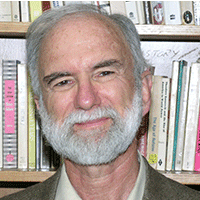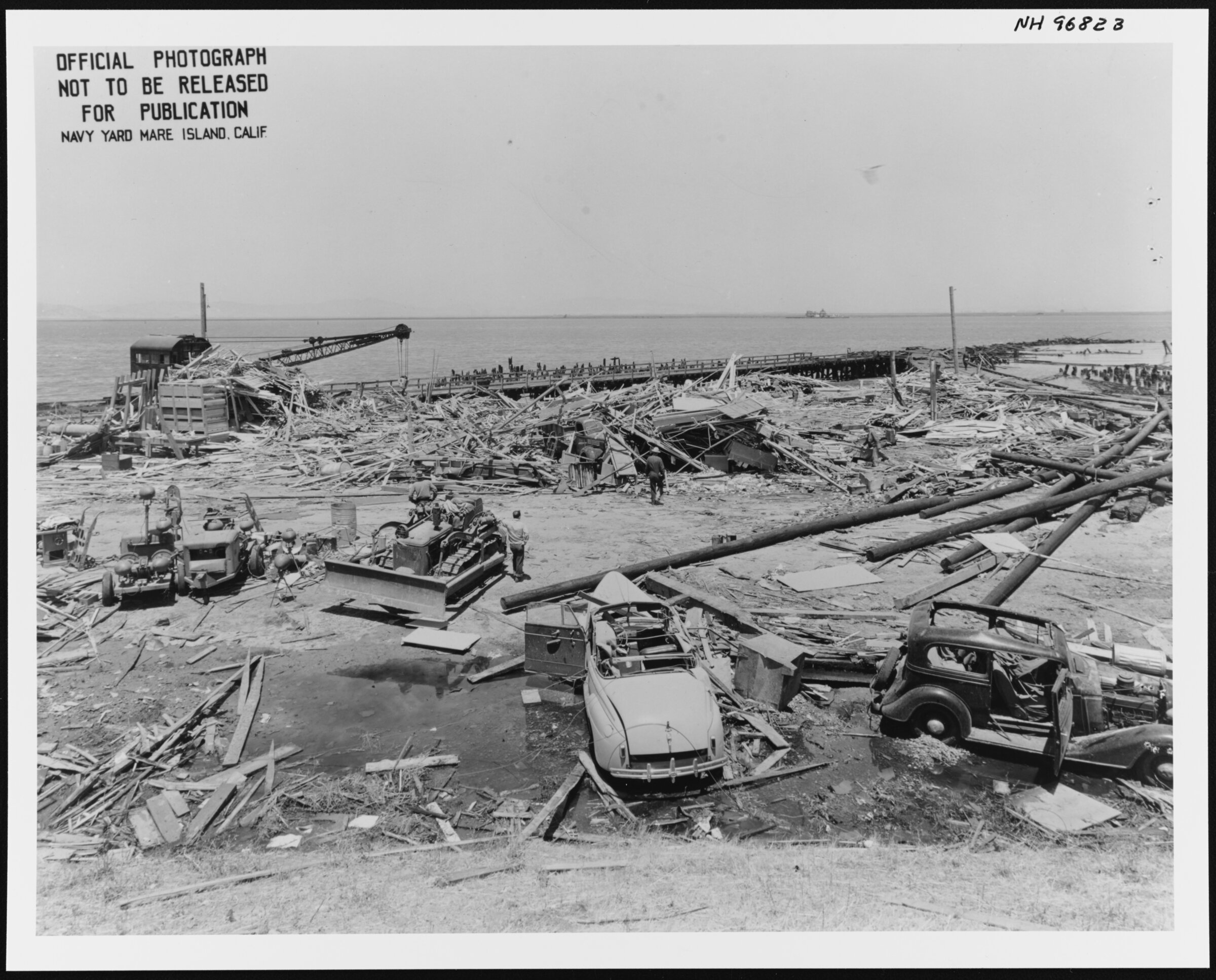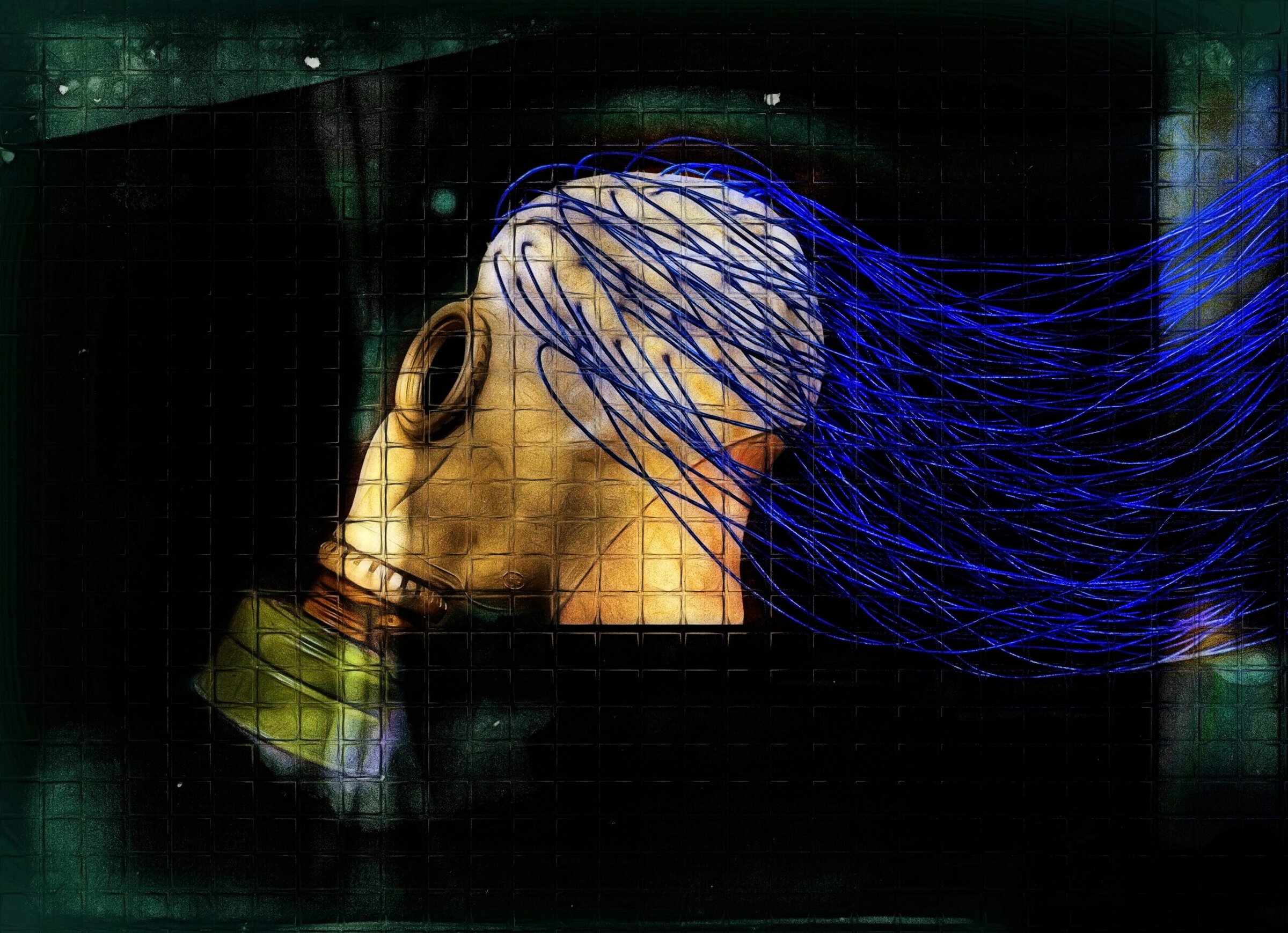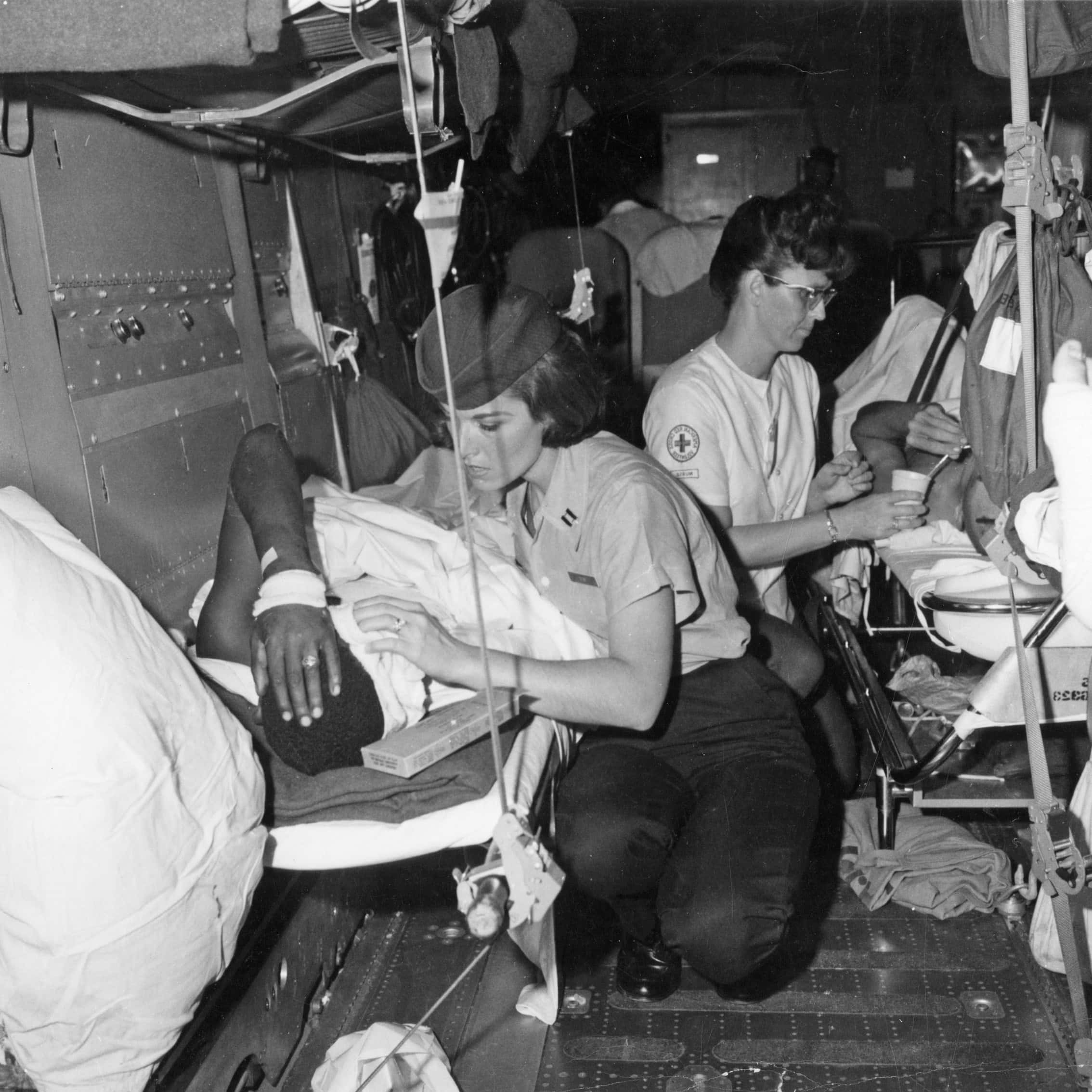When Peter Rollins submitted the review of A Bright Shining Lie (ABSL), he suggested that the director, Terry George, might want to respond to his comments. I communicated with George, and he agreed to an interview. Because Terry George served as writer for three important films about “The Troubles” in Ireland (In the Name of the Father, Some Mother’s Son, and The Boxer) and also directed Some Mother’s Son, I sensed that readers of Perspectives would also be interested in learning about his handling of those history-oriented dramas. Accordingly, this interview branches out into wider discussions about film and history.
ROBERT BRENT TOPLIN: You are well known for making several excellent motion pictures about “The Troubles” in Ireland, films such as Some Mother’s Son, In the Name of the Father, and The Boxer. Did your interest in Ireland’s tragic history affect your approach to Vietnam’s history?
TERRY GEORGE: The reason I came to this subject in the first place was because, having read Neil Sheehan’s book, A Bright Shining Lie, I recognized in John Paul Vann a traditional warrior who was a modern-day samurai, a person devoted to the art of war. I have come across characters like that on all sides in Northern Ireland, and they fascinate me, because they construct a morality that is outside the framework of civilian democratic morality, and they believe they hold themselves to a higher cause. It is a sort of soldier’s or warrior’s code of war. For a great part of history such people have been at the core of the greatest dramas. Now they are starting to disappear because of the technology of war.
TOPLIN: Some critics objected to ABSL’s treatment of John Paul Vann, arguing that the TV movie portrays him as a flawed hero. But isn’t that a central thesis of Sheehan’s book? The “Bright Shining Lie” in the title refers not only to U.S. deception regarding Vietnam but also to Vann’s concealment regarding his own background. For example, Sheehan reveals that Vann was haunted by his illegitimate birth and troubled by his sexual athleticism (he got into a scandal with a young babysitter that almost ruined his career). Your film shows Vann’s extraordinary energy, vision, and chutzpah, but it also suggests that he had clay feet. Do American television executives and viewers have a problem with that? Do they have difficulty dealing with ambiguity—a story in which the central character receives both a positive and negative portrayal? Do television dramas dealing with a single historical figure usually present a rather simplistic, heroic portrait?
GEORGE: I think Hollywood has difficulty dealing with some of these characters. I don’t think the public does.
I tried to portray Vann as a human being. Here was a guy who had lots of flaws. Politically he was certainly right wing and sexually he verged on the perverse. Certainly he was a misogynist. He had a very weird perspective about women. Well, maybe not that weird, actually. If you look at the western military men going to the Far East at that time, you see that they did things in Thailand and Vietnam that have left the legacy of the sex industry in that part of the world and certainly allowed it to blossom. I think that John Paul Vann was symbolic and symptomatic of that. But, at the same time, I didn’t want that to be the focus of the story. We were telling the story of a man who became a microcosm of what America itself became in Vietnam. I needed also to track the political and military history of the man. If there was one thing that came across, it was this guy’s courage, lack of fear, and strength in battle. Again, you are looking for essence in trying to boil all of this down, and sometimes the pot isn’t big enough for the stew. I accepted that the form was a movie of little more than two hours. And I had to go for it.
TOPLIN: In selecting the story of a man from recent history, you risked stepping on the toes of real-life figures from Vann’s life. For instance, the film includes characters who seem to represent David Halberstam, who wrote The Best and the Brightest, and Daniel Ellsberg, the man who released the Pentagon Papers. Did these individuals give you difficulty? According to news reports, they objected to having their names used in the story.
GEORGE: We put a composite reporter in there who was with Vann over the course of the war. He was a composite figure who represented, I guess, Halberstam, Peter Arnett, and Sheehan. He represented the American press and its evolution toward the war. In Ellsberg’s case we had a character who was very close and similar to him, and Ellsberg objected very strongly to that character’s portrayal. I changed the name and changed the character a bit. In that case Daniel Ellsberg had a very personal perspective on John Paul Vann, and he was not prepared under any circumstances to have that character portrayed in a way that he did not have total personal control over. Everybody has their own personal film in their head, and when you come to make a film about people who are only peripherally involved they are going to want their own movie made. I got a 40-page diatribe from Daniel Ellsberg. It was an analysis of a first draft of a script, which is basically a sort of shooting fantasy in my head.
Somehow all of these guys got their hands on this first draft, and we had a lot of trouble about that. The situation was quite humorous. We had David Halberstam, Neil Sheehan, and Daniel Ellsberg—two Pulitzer Prize winners and a sort of political icon of the age—critiquing the first draft of a script. It is like me getting hold of David Halberstam’s notes forThe Best and the Brightest and mounting a campaign against the book. So I wrote them all and asked them to calm down and wait until the film was out.
TOPLIN: Which message about the American experience in Vietnam did you wish to convey through your movie? How did you try to communicate it?
GEORGE: I felt basically that I had to take a stand on the war that the book took, which is basically that this was the great American folly of the 20th century and that John Paul Vann was a microcosm and in some ways a perfect character study of that problem. So that’s where the political bent of the film came from. Within that framework, I told the story of a man and developed his character so that the audiences came to know him and sometimes empathize with him and sometimes feel repulsed by him.
TOPLIN: Peter Rollins, in his review of ABSL in this issue of Perspectives, says “Terry George wants his audience to see America as a brutal bully imposing itself upon an innocent, Third World nation. As latter-day imperialists, we have lost our sensitivity to the aspirations of ordinary people and have sent a deadly killing machine to torch the garden of Vietnam.” Your reaction?
GEORGE: If you look again at the movie, that’s not the way I presented it at the start. I tried to portray the evolution of American involvement, and certainly by the time the film got to Lyndon Johnson’s manipulations, Tet and post-Tet, and Richard Nixon secret war, there was some evidence of that.
I think that statement [of Rollins] is more political and more biased than is the film. Rollins’s remarks speak more of politics than the production itself. Everybody has a point of view. A neutral film is pointing a camera at a blank screen and leaving it there. Once you have made the decision to point the camera at someone for five seconds and at someone else for a minute and a half, you have made a political decision. I don’t believe in neutral films. I don’t believe that they exist.
TOPLIN: All films, then, have a point of view. And ABSL has one on Vietnam.
GEORGE: Yes, I have a point of view on the Vietnam War. It’s probably centrist or left of center, and it has a lot to do with my experience in Ireland. At the same time, I try to be objective about it and I think the portrayal of Vann and the American army and of how they got there and how they ended up was a fairly legitimate argument that is supported by a broad cross section of this country.
TOPLIN: Let’s turn to your films about Ireland. You were the writer for In the Name of the Father, and that movie attracted tremendous international interest and acclaim. Did related questions about bias apply to that film? Did some critics claim that you and Jim Sheridan (the director) had an agenda?
GEORGE: Everybody who wrote about the film had an agenda. There was no way that we could try to portray ourselves as neutral filmmakers. We had a point of view that we felt strongly about and we were going as far as we could to carry that message forward, and that message was about injustice and triumph over injustice.
Yes, I’m from Belfast and Jim was from Dublin. And at the end of the day there is no such thing as neutrality in Northern Ireland. We always stated up front where we were from and that we were presenting an argument that we thought was forceful and true. We put that message out to the world with no apologies. And I happen to have great faith in the public. You have to go a long way to hoodwink.
TOPLIN: Did some claim that the film was anti-British in spirit?
GEORGE: The conservative newspapers in Britain did a journalistic deconstruction of every scene and shot in the film, saying that it was anti-British propaganda. I don’t know if it was fair or not, because I don’t know what that word “fair” means in the context of film. The picture was righteous and honorable, and I think it needed to be seen. And that’s the criteria that I try to work with all the time.
TOPLIN: Did you write the story from the perspective of personal experience—at least to a degree?
GEORGE: I had been in prison from 1975 to 1978 for my involvement with the Irish Republican movement and Sinn Fein, and I had also had years of direct experience with that in my youth. Those experiences gave me a depth of understanding that a lot of writers would not have. That was the genesis of all of this—trying to write about situations that I’ve witnessed. Then I tried to convey them in a universal form.
I was in what the British called the Maze and what the Irish called the Long Kesh during the hunger strike. I knew the kind of core feeling and drama of it, and I knew Gerry Conlon personally before he went to prison, and I knew one prisoner who was very similar to Conlon.
TOPLIN: How did you research Gerry Conlon’s story? Did you conduct interviews?
GEORGE: That was a very satisfying experience. He had just got out of prison, and he was experiencing free life after 15 years. He was drinking a lot and partying a lot. It was hard to tie him down. I got him to come to the United States, and I put him in a car, and I drove to Key West and back. I taped him along the way, and that was the basis for 16 two-hour tapes that became the basis for the film. In that journey, the structure of the movie evolved. It was an interesting way to get to the core of it.
TOPLIN: As a dramatist, you have to “invent” characters, scenes, and dialogue. For example you put two Irish prisoners together in the motion pictureIn the Name of the Father when, in fact, they were not confined together. For that movie you also compressed two separate court trials into one. Such creativity (some call it dramatic license) is fundamental in crafting a dramatic film. Journalists and historians sometimes object to these artistic liberties. How would you attempt to persuade them that fictionalizing is necessary and justified? Indeed, what constitutes “good” fictional history?
GEORGE: Inevitably, you are going to have to compress and manipulate and stretch and invent—at least to some degree—to make the story work as cinema. For me, the first obligation is to entertain. In historical and political drama you are walking the tightrope between entertainment and the presentation of reality. That’s a challenge, but it’s part of what I enjoy about this job.
The great majority of that film is based on reality. We took the details and boiled them down. We had a couple of composite characters in it. There was no wholly invented character. There were a few composite characters in there because a lot of those people walked in and out of the drama over 15 years. The composite characters represented key figures or groups in that story, such as the police, the judiciary, the prison officers, and the IRA. The only people who spanned the drama over 15 years were, in fact, the Guildford Four, so, in the case of the police officers and the judges, we invented one character who represented the role of the police force and attributed to him some of the events and activities of several police officers. In the end we felt that the character validly represented the way the police conducted themselves over the 15 years.
There was never any dispute about the basic story. Gerry Conlon was wrongfully accused of a bombing. He was sentenced and imprisoned. His father came to try and rescue him. His father was also wrongfully accused. The father died in prison. The son struggled to clear their name, and he did so. That’s the film. No one has ever challenged a single item of that. Now, whether Gerry Conlon was in a cell with his father or in the next cell and whether judges said in a courtroom “please approach the bench” doesn’t make an iota of difference.
I’m sure if you go through the mountain of print that was published about this you will find some stronger objections, too. For instance, Gerry Conlon certainly was not Daniel Day Lewis. Inevitably you end up with a star whose charisma overshadows the person that they are playing.
TOPLIN: We hear a lot of loose talk about the tremendous influence of movies on the public’s thinking about the past. Some historians lament that influence; others display excitement about the potential of dramatic films to engage the audience’s interest in history. Yet it is difficult to document the movies’ influence. Do you have some sense of the impact of your films on public opinion? How did your motion pictures about “The Troubles” play in England and in Ireland?
GEORGE: You always have people coming up to you and saying that I saw this film and it changed my perspective. President Bill Clinton watched In the Name of the Father early in his presidency, and evidently it had an impact on him. I guess, of all the American presidents, he has been the most forceful in involving himself and trying to resolve the Irish conflict, and that was good to hear. Of all the films that have been made about Northern Ireland, In the Name of the Father seems to have been seen by the most people and was the most successful. I think it had a substantial impact. It also had an impact on the community in Northern Ireland, the people who felt that their voice was not being heard.
TOPLIN: How would you describe that impact on the Catholic Irish community?
GEORGE: When a community is isolated and depressed and rebellious and then starts to feel that it has a voice and is being heard, some of the venom begins to go out of their feelings and their argument. The Catholic community in Northern Ireland started to feel that the grievances they had suffered silently for 70 years were beginning to be heard by the British public.
TOPLIN: Finally, a question that often comes up when historians talk about feature films that deal with the past. What are the challenges of turning fact into film? If members of our history profession intended to try a career in historical drama, what advice would you give them? How would they need to think about the differences between communicating an understanding of history through teaching and writing, and communicating it through dramatic film?
GEORGE: It would be a learning experience for them. If they have a story and can write down five sentences about what that story is about and then look closely at those five sentences and decide if that’s entertainment, then they have the basis for a film.
When I say entertainment, I don’t mean comedy. I mean something that moves an audience’s spirit, that uplifts them. They should ask: Is the essence of this story entertainment? Will it take an audience where people will feel not necessarily good but that they have spent their money well? That’s the kind of measure I look for. I am presented with a lot of historical stories now. A lot of it is going to be difficult to translate.
The great historical dramas are usually character driven—as in A Man for All Seasons, Patton, and Lawrence of Arabia.
I think the John Paul Vann story was so interesting because the character was so dark. It takes the audience into the war through the eyes of one man. Within this character lies the nucleus of the story. That is what we would be looking for. A Bright Shining Lie presents the historical event through the character’s own experiences. Within his personal drama you get the essence, and the audience feels then that it has had some insight into that particular historical event.



